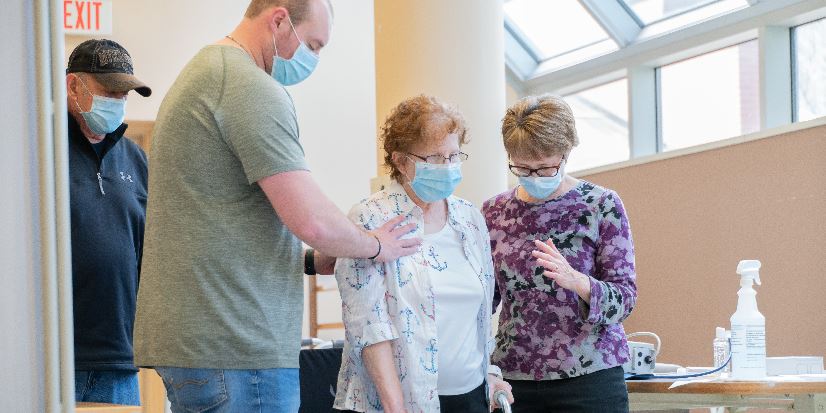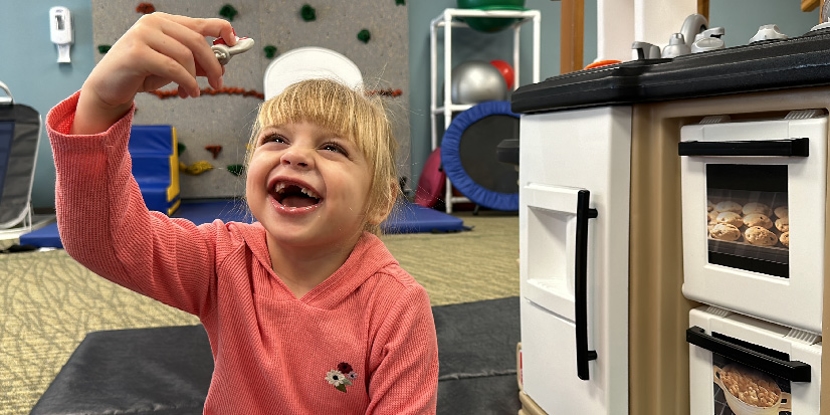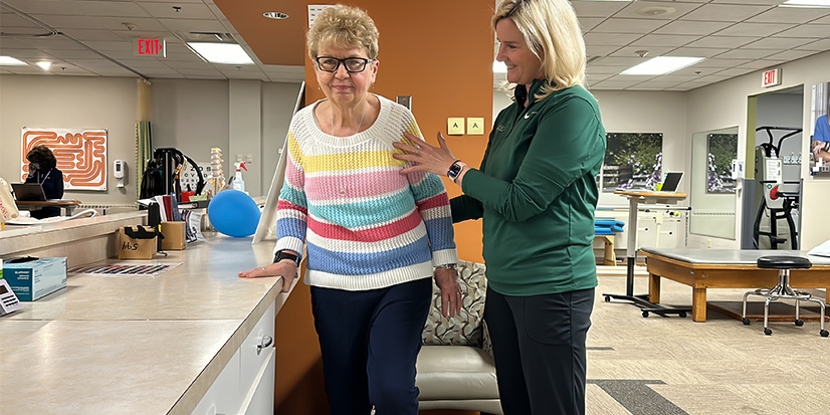Angela J.
- Author: Angela J.
- Date Submitted: May 13, 2020
- Category: Stroke


“ “She always put everyone ahead of herself and now when she needed us most, we couldn’t be there.””
Seeing a loved one suffer a stroke is always upsetting. Not being able to be there to provide physical and emotional support during the aftermath can only add to the distress family members experience. Due to visitation restrictions in place at medical facilities nationwide during the COVID-19 pandemic, that what's the family of Angela J, a stroke survivor from Old Forge, experienced.
“She always put everyone ahead of herself and now when she needed us most, we couldn’t be there.”
That was how Ryan J. felt the day he found his mother unresponsive on the floor of their Old Forge, PA home. Then as the ambulance rushed her away, leaving him and his father behind, “we were helpless. All we could do was wait.”
On a Wednesday morning in early April 2020, Richard was alerted by his dog Ralph’s strange behavior. When he followed him to see what was the matter, he entered the living room to find his wife, Angela, lying motionless and face down on the floor. He quickly yelled to his son Ryan and they waited by her side for the ambulance to arrive. As the Emergency Medical Technicians (EMT) tended to Angela, they informed Ryan and Richard that they would not be allowed to go in the ambulance with them to the hospital and there would be no visitation at the hospital either. Little did they know that besides this hurdle, this would be the last time they would see their wife and mother in person for almost a month.
Due to restrictions in place as a result of the Coronavirus (COVID-19), EMT’s told Richard and Ryan that only one person was allowed to sit in the waiting room at the Emergency Room. No one would be allowed in to see her. Rather than be separated even more, they opted to stay together at home and wait to hear what was happening.
As they waited, they finally received a call from Geisinger Community Center that Angela had suffered a hemorrhagic stroke.
A hemorrhagic stroke is when blood from an artery begins bleeding into the brain. This happens when a weakened blood vessel bursts and bleeds into the surrounding brain tissue. Pressure from the leaked blood damages brain cells, and, as a result, the damaged area is unable to function properly.
In Angela’s case, the resulting damage left her unable to speak, swallow, or move her right side.
The bleeding in Angela’s brain stopped on its own and no surgery was necessary. However, she remained in the hospital for monitoring and testing to ensure that she was stable and the bleeding didn’t recur. Throughout this time, the only contact Ryan and Richard had with Angela was one Facetime call and a few other phone calls. Angela wasn’t able to speak, adding to the communication barriers. The calls were still important for her morale, allowing her son and husband to give her encouragement and support.
Soon, Angela was transferred to Allied Services Rehab Hospital in Scranton to begin her stroke recovery, but she would still remain separated from her family.
“We were able to catch a glimpse of her as they took her off the ambulance, but that was it,” noted her husband. Angela's family was able to drop off some of her belongings. However, the hospital's precautions to prevent the spread of COVID-19 do not allow visitors from entering the facility.
The stroke team at Allied Services Rehab Hospital began with an evaluation of Angela's functionality. On arriving at the facility, she was already regaining her ability to swallow, but was still unable to speak and movement on her right side was greatly compromised.
“We began with trying to stand and take a few steps, assisted, around a table. At first we could barely do that, but as she practiced she improved and we were able to do more and more,” notes physical therapist Suzanne Jones. “We were able to use the ZeroG Gait Training System and as she progressed we were able to use it in tandem with the split-belt treadmill.”
The Zero-G gait training system works by providing dynamic body-weight support to a patient, while the patient is wearing a fitted harness. The support of the Zero-G compensates for weakness or poor coordination allowing for more intense therapy sessions earlier in a patient’s recovery. With the patient supported by the system therapists are then able to focus on the patient’s movements and incorporate more into their sessions.
Incorporating the use of a split-belt treadmill can be helpful for those suffering with gait issues as well. A split-belt treadmill features two separate belts running alongside each other, one for each leg. The two belts can move together or at independent speeds. Because each leg has to adapt to a different speed, it forces your legs to adopt individual stride lengths in order to keep balance.
While still separated from Angela, her family continued to stay in touch with more frequent Facetime calls, and as her speech began to improve regular phone calls became easier.
“When she first came in she really wasn’t communicating at all, her swallowing ability was impaired - and I knew it was going to be a challenge. Then little by little she started to communicate more and more,” notes speech therapist Gina Phillips. “We really started at the ground level with a six picture communication board that she pointed to. Now she is speaking in full sentences and very close to being able to have a normal diet.”
Gina notes that family involvement is a crucial part of a patient’s journey and can help aid in the recovery of a patient’s functional speech. The new restrictions because of the pandemic have made that aspect very hard.
“As a therapist it’s important to understand how lonely they (patients) may feel and how scared they may feel, because no one familiar is here. COVID has made huge barrier to comfort and is difficult to navigate, but you work with what you have,” notes Gina.
“You could see Angela had a great support system at home by all the cards and flowers that were in her room. We would use those items to start identifying the people that sent them. We would read text messages together and Angela would light up knowing her family was waiting for her. Angela is a fiercely independent woman. Seeing how very determined she was and always ready work - she surpassed any expectations that I had when I first met her.”
Now, nearly a month since her stroke, Angela is ready to be discharged. She was reunited with her husband and son at a family training session in a designated area within the rehab hospital. Family training sessions are held with a therapist, the patient and family members that will be helping at home. Each family member learns how to aid the patient with their needs - whether it’s standing, sitting, walking, feeding, etc. They learn cues from the patient and the patient learns how to communicate their needs and comfort level.
“We’re so excited to be getting her back and we are eternally grateful for all the staff that helped her,” noted Ryan. “She is doing amazing. From where she started, I never thought she would be this good again.”
Angela will return home with continued support from Allied Services Home Health and Outpatient Rehab Services.



